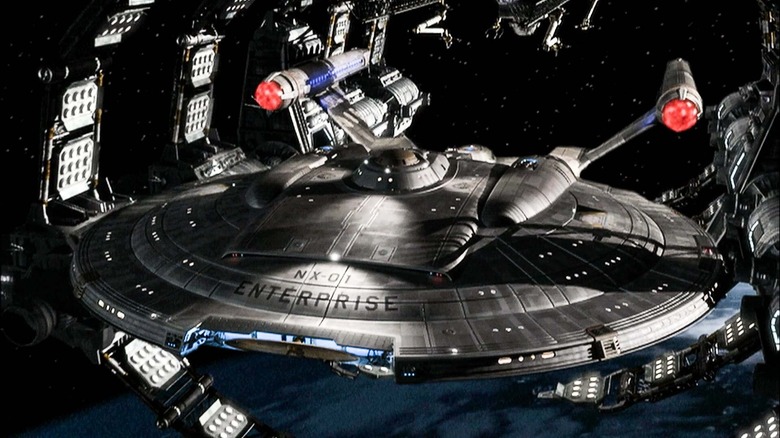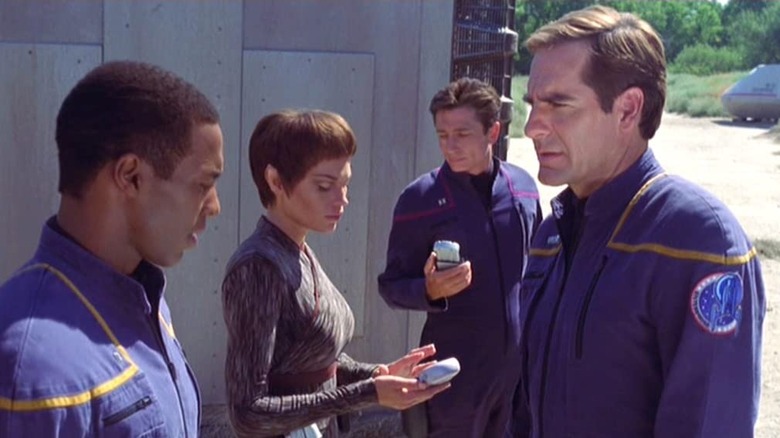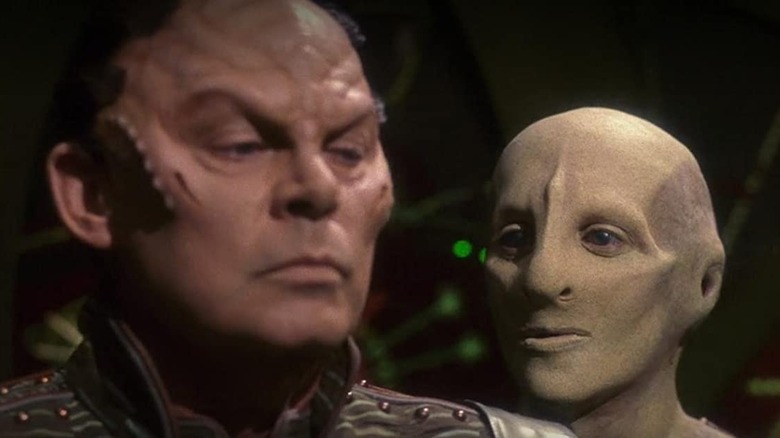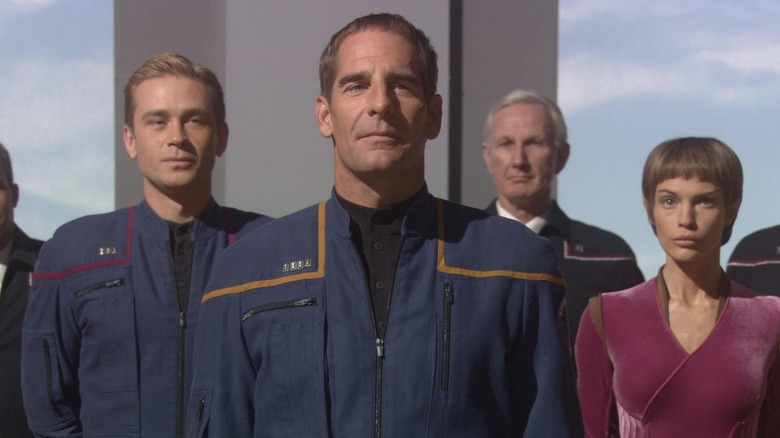How Star Trek: Enterprise Took The Franchise Into The Post-9/11 World
The approach to "Star Trek: Enterprise" was dramatically different from the three shows that preceded it.
From the debut of "Star Trek: The Next Generation" in 1987 to the conclusion of "Star Trek: Voyager" in May of 2001, the franchise followed more or less the same timeline, often with two different series overlapping. To watch the show in chronological order, one needs to ping-pong between 1990s shows. Once "Voyager" ran its course, the field was clear for a new "Star Trek" to set a new tone and begin a new mythology. "Enterprise" (it debuted without the "Star Trek" part of its title) was equal to the task, throwing events back to a century before the original series. The show was set on board the very first Earth ship to leave the planet and go on an exploratory space mission. It was set prior to the invention of shields, human-safe transporters, working universal translators, tractor beams, or, importantly, the Prime Directive.
The characters were depicted not as experienced diplomats, but wide-eyed adventurers, eager for new experiences. It was clear the makers of "Enterprise" wanted the show to recapture some of the frontiersmanship that hadn't been part of the series since the days of Kirk and Spock. Episodes were more slowly paced, settings were more intimate, and a lot of Trek details that Trekkies had taken for granted hadn't yet been established. Vulcans, for instance, don't yet regularly do mind melds; it's strictly taboo at this time. For Trekkies eager for a simpler, NASA-inflected version of "Star Trek," "Enterprise" was meant to fill that niche.
"Enterprise" debuted on September 26, 2001, immediately after 9/11. The world wasn't in the mood.
Star Trek in a post-9/11 world
To reiterate what Trekkies often say: "Star Trek" takes place in a potentially utopian future, when war is at an end, money is gone, and diplomacy rules the roost. Humanity has joined in a galactic alliance with many other species to eliminate want, greed, and military might from the universe. They seek not to conquer, but to explore, expand, and to better themselves. Technology is used responsibly, and when it is misused, it is seen as either a villainous failing or a chance to correct a mistake. "Enterprise" was meant to be about how that utopia was hard won, but ultimately worth the struggles. It was also meant to show that humanity, even after a century of exposure to Vulcans, are finally ready to head into the stars and make a few mistakes. It was going to be sloppy, but ultimately hopeful. Trekkies knew that utopia lay ahead.
After the events of September 11, 2001, much of the world was not in a utopian mood. The idea of solving conflicts through diplomacy and togetherness was giving way to "We'll put a boot in your ass" rhetoric. Trekkies may complain about the tonal shifts of "Enterprise" or its dramatic redesigns — the title ship was steely and submarine-like rather than posh and comfortable — but the real reason it infamously suffered in the ratings may be directly attributable to the fact that "Star Trek" seemingly had no place in a world that was smarting from a dramatic terrorist attack, or while many were itching for violent, battlefield retribution.
It was a time when "Star Trek" was most desperately needed, and a time when it was being actively rejected.
Season 3
It's also worth noting that the early 2000s were a transition time for TV in general. Showrunners began to favor extended, season-long story arcs over episodes, likely thanks to audience's newfound ability — thanks to the ubiquity of DVDs and the rise of streaming technology — to binge entire seasons of TV in one sitting. "Enterprise" was being visibly pulled between short-form and long-form storytelling.
"Enterprise" limped along for its first two seasons, never quite gathering the popularity of its forbears. In 2002, "Star Trek: Nemesis" also tanked (it is, to date, the lowest-grossing Trek film), and the franchise seemed to be in trouble. But seeing as "Star Trek" was often keen on exploring social issues through the lens of sci-fi details, the makers of "Enterprise" decided, at the beginning of its third season, to shift the show's focus dramatically.
At the head of season 3, which debuted on September 10, 2003, a mysterious unknown species called the Xindi appeared above Earth and, unprovoked, destroyed the state of Florida. This attack saw the Enterprise reconnoitering back on Earth, and assigned with the task of finding out who the Xindi are and why they attacked Earth. A retinue of jarheads was brought onto the show and Captain Archer (Scott Bakula) transformed from a wide-eyed astronaut into a cold-hearted, revenge-minded military commander. The third season was, in "Star Trek" traditions, presented with an air of tragedy. As if military revenge for a terrorist attack wasn't a great idea.
But it fit the mood of 2003, and, with a new story to focus on, the show was said by many Trekkies to immediately improve. At the very least, it had a greater focus of intent. It also allowed the show to evolve into longform narratives.
But is it Trek?
While the Xindi plot on "star Trek" was novel and interesting — the Xindi were, in fact, five intelligent species who evolved on the same planet simultaneouesly — it felt to this old Trekkie like the franchise was spinning its wheels, reaching desperately for something that felt relevant. While the show's fourth season branched away from the Xindi plot and began leaning into three- and four-part episodes, it still never seemed to hit a new stride. It was an interesting show, the writing was good, and the characters were, for the most part, dynamic, but the fact remained that Gene Roddenberry's ideas still weren't welcome. The show's final episode ran on May 13, 2005, canceled after only four years.
Then Viacom infamously split and the franchise seemed to end. Trekkies were at peace with this.
There would be no "Star Trek" again until the summer of 2009 when J.J. Abrams rebooted the film series with a new cast playing the characters from the 1960s TV series. In that film, Kirk, Spock, and McCoy were younger, hotter, more impulsive versions of themselves. That, too, was a timeline marked by a major terrorist attack — the destruction of Vulcan — this time, at the hands of a vengeance-minded terrorist from the future. The film featured explosions, shooting, swordfights, and so, so much action. The film was a hit.
This, it seems, is what audiences wanted from "Star Trek" post-9/11. They essentially wanted "Star Wars." It's telling that after "Star Wars" itself was rebooted in 2015, that action-packed "Star Trek" was largely abandoned. Violence and revenge were in vogue. Diplomacy was still out.
It's only now, in the 2020s, that Trek finally seems to be finding its way again. "Enterprise," meanwhile, was a casualty of the times.



